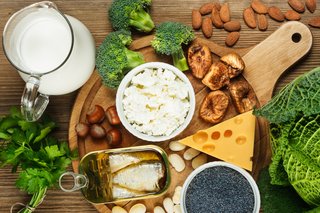Daily activities can strain bones and joints, especially for arthritis patients. Milk, spinach, almonds, seeds, green vegetables, beans, lentils, and soybeans are vital for bone health.
Our bones and joints are stressed by daily activities including walking, running, sitting, dancing, and climbing stairs. Winter, especially for arthritis sufferers, may be difficult. This season requires prioritizing bone and joint health. Due to less sunlight, vitamin D levels drop in winter. Vitamin D is essential for bone health, thus its decreased absorption from food may cause bone and joint degradation. This emphasizes the significance of preventive bone and joint health measures, especially in winter.
Nutritional Foods for Strong Bones
The body constantly regenerates new bones and breaks down old ones. Due to increasing bone mass, juvenile turnover is faster. However, neglecting bone mass maintenance might lead to osteoporosis as one ages. Eat these nutrient-rich foods to strengthen and maintain bone health.
Milk and dairy
Calcium, protein, vitamin D, potassium, and phosphorus are found in dairy products, which are healthy for bones. Fortified foods rich in vitamin D are advised for maintaining appropriate calcium levels. Three glasses of milk, especially if it’s the main calcium supply. Making smoothies or adding flavors might make plain milk more attractive.
Spinach
Spinach is a nutritious powerhouse with calcium, iron, vitamins, and minerals. Adding spinach to one meal per day helps your weekly nutrition plan. The adaptability of spinach allows for many culinary creations. Spinach soup, vegetables, sandwiches, and paranthas are all delicious ways to include this nutrient-rich green in your diet.
Seeds & Nuts
Choose nutrient-rich snacks during free time. Avoid junk and enjoy seeds and nuts’ health advantages. Some of the greatest calcium in seeds are sesame, chia, hemp, pumpkin, flaxseed, lotus, Brazil nuts, and pistachio. Almonds, walnuts, pecans, and chestnuts are calcium-rich and prevent osteoporosis. A handful of these nuts in your diet satisfies snack cravings and supplies bone-healthy nutrients.
Vegetables Green
Eat a variety of green vegetables to improve bone health. Collard, okra, beetroot, broccoli, kale, Brussels sprouts, mustard, and turnip greens are great. These seasonal vegetables provide calcium and bone strength. Better than spinach, these greens are high in absorbable calcium. Their bone health benefits from this distinction.
Beans, Lentils
Add lentils, beans, and whole grains to your diet for a balanced diet. This combination promotes bone health and delivers proteins, vitamins, minerals, and other nutrients for overall health. Legumes and whole grains also support heart health, demonstrating the many benefits of this nutrient-rich combination in building a strong body.
Soy Beans
In addition to providing vegetarian protein, soybeans boost bone strength, an often-overlooked benefit. In addition to soybeans, try additional soy-rich items that suit your tastes. Soy beverages, soy milk, and tofu are tasty ways to add protein and bone health to your diet.
Conclusion
Daily activities like walking, running, and climbing stairs strain bones and joints, especially arthritis sufferers. Vitamin D levels drop owing to decreasing sunlight, which may damage bones and joints. Nutritional foods include milk, dairy, spinach, almonds, seeds, green vegetables, beans and lentils, and soy beans assist bone and joint health. Milk and dairy products include necessary nutrients, while nuts and seeds are healthy. Green foods like collards, okra, beetroots, broccoli, kale, Brussels sprouts, mustard greens, and turnip greens are good for bones. Beans and lentils contain protein, vitamins, minerals, and vital elements. Soybeans, a vegetarian protein, strengthen bones. Including soy in your diet helps improve bone health.



